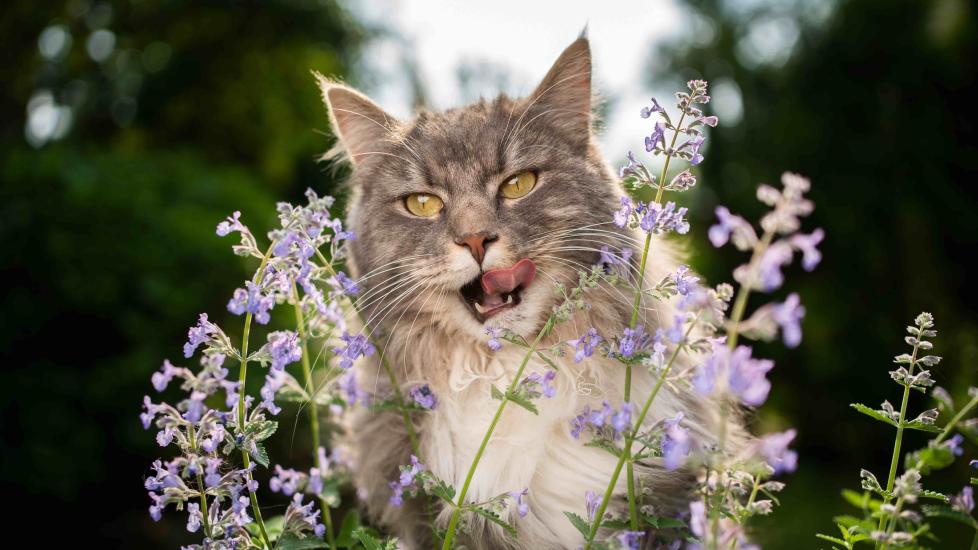What Is Catnip and What Does It Do to Cats?
Adobe Stock/FurryFritz
Many people are familiar with catnip, but not everyone knows what type of plant it is or the science behind how catnip affects a cat’s mood and behaviors.
So, what is catnip, exactly? Here’s what to know about how this plant can affect your feline friend.
What Is Catnip?
Catnip, or Nepeta cataria, is a common herb that is a member of the mint family. It’s a plant that’s easy to grow in North America and has light-green foliage with lavender flowers.
Catnip leaves have actually been used to make tea, and the flowers are said to relieve coughs. It’s also a main ingredient in some natural bug sprays.
What Does Catnip Do to a Cat?
Cats have an extra scent organ called the vomeronasal gland in the roof of their mouth. This special pathway allows scents that are collected in the nose and mouth to be carried to the brain (and it’s why cats make a stinky face when they smell certain odors).
Nepetalactone is an oil found in the catnip plant’s leaves, and it can cause behavioral changes in cats. For a cat to be exposed to this substance, they have to smell the catnip.
So, why do cats like catnip? Catnip mimics feline sex hormones, so cats enjoying this substance will often display behaviors similar to a female cat in heat (although both male and female cats can experience the effects of catnip).
These behaviors can include overt signs of affection, relaxation, and happiness. Other cats will display active behaviors, such as playfulness or sometimes even aggression.
How To Use Catnip
Catnip is available in different forms, including:
-
Fresh catnip (growing your own catnip plant)
-
Dried catnip
-
Catnip sprays or bubbles
-
Toys stuffed with dried catnip
Catnip sprays are a good option for cats that get an upset stomach from ingesting the plant. You can spray your cat’s favorite toy, cat tree, or scratcher. You can also sprinkle dried catnip on your cat furniture or even roll a toy in it.
Some of the top recommended catnip brands/products include:
Some veterinarians have recommended using catnip to help with separation anxiety if your cat will be home alone for an extended period of time. For cats that have a positive experience with catnip, it can help reduce anxiety and even relieve pain.
Does Catnip Work on All Cats?
Not all cats will respond to the active compound in catnip. Veterinary studies suggest that about 60% of cats will have a behavioral reaction to catnip. If your cat does not react to catnip, you can try silvervine.
How Long Does Catnip Last?
Catnip effects vary in length, depending on the cat. Usually, the behaviors associated with smelling catnip will last for around 10 minutes and then wear off gradually.
It could then take 30 minutes without smelling catnip for the cat to become susceptible to the effects again.
Catnip does lose its potency over time, so it’s recommended to keep it in an airtight container for maximum freshness.
Can Kittens Have Catnip?
Catnip is not harmful for kittens, but most cats won’t react to catnip until they are 6 months to 1 year old. Some cats can be exceptions to this rule.
Can Cats Eat Catnip? Is It Safe?
Cats can safely eat catnip, and it may even be helpful for their digestive tract.
The catnip plant has actually been used in people for its antidiarrheal properties. With this said, it is important to prevent your cat from ingesting large amounts of catnip, as this can cause digestive upset.
Can Cats Overdose on Catnip?
Cats cannot overdose on catnip, but too much catnip can cause some health problems, such as vomiting, diarrhea, dizziness, or having trouble walking. Use just a tablespoon at a time, and you can always discuss the correct amount for your cat with your veterinarian.
Fresh catnip is more potent than the dried form, so you won’t need to give your cat as much of it. It is also recommended to avoid highly concentrated catnip oils due to their potency.
